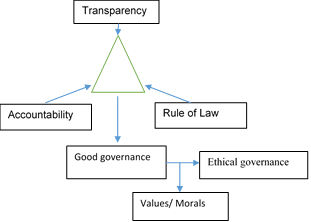Mains Daily Question
Nov. 22, 2019
Q. The term ‘governance’, ‘good governance’ and ‘ethical governance’ though looks similar, yet signifies different idea. In this background, differentiate the above-mentioned terms in light of governance structure in India.
Structure of the answer:
- Introduction
- Meaning of different terms with help of example
- Final analysis/ conclusion
The term ‘governance’, ‘good governance’ and ‘ethical governance’ appears to be used interchangeably and are intrinsically interlinked. Yet, each of them signify different meaning in their own sense. The same are discussed below with help of examples.
The term ‘governance’ is defined as follows:
- It is the exercise of economic, political and administrative authority to manage a country’s affairs.
- It is also the process through which various stakeholders articulate their interest, exercises their rights and mediate their differences.
- Many times it is defined as interface between the government and those governed. For ex.- delivery of public services like food, education, health.
In this context, 2nd ARC suggested various measures to improve governance, therefore the word ‘good governance’ implies:
- Responsive, accountable, sustainable and efficient administration at all levels.
- Further, transparency, accountability, rule of law, principle of subsidiarity and citizen first form basics of good governance. For ex.- delivery of services like PDS shall be quick, devoid of middlemen, reach even the most marginalised at minimum cost.
Whereas, the concept of ‘ethical governance’ is value laden, it means:
- Administrative procedures and policies shall fulfil criteria of ethical handling of public affairs.
- Utilitarian approach (Bentham’s approach) is followed to serve maximum good and difference between ethical-legal is handled appropriately.
Hence, governance shall be good as well as ethical.


